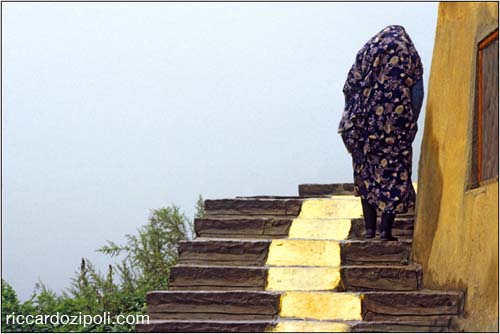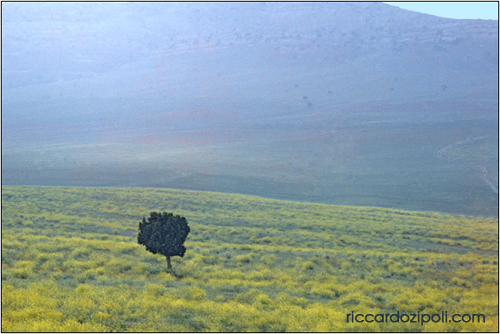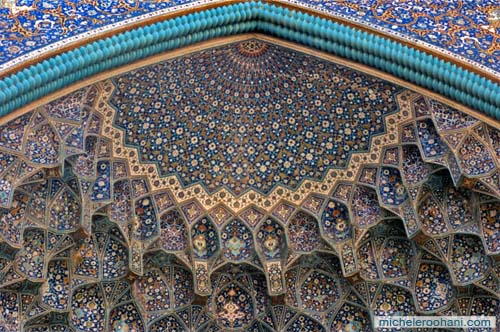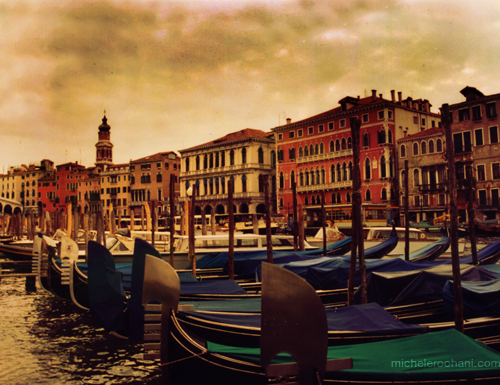My smile got bigger and bigger as I continued listening to Professor Riccardo Zipoli talking about Iran in his near perfect Persian; but then I got a bit frustrated remembering that in spite of speaking three languages myself, I have to applaud every non-Persian who can say 4 words in my mother tongue! Listen to him talk here to see what I mean by Zipoli’s flawless Persian.
These two pictures are from the Professor’s huge archive. He has a soft spot for the rural landscape/people of Iran.
Born near Florence, teaching in Venice, reciting Sohrab Sepehri better than most of the natives has endeared Zipoli to Persians. I particularly like his Tree series. You can find more of his pictures on his site.
Looking at these images made me nostalgic so I went to look for some pictures from my last trip to Iran about 14 years ago. Here is one of my favorites from the Shah’s Mosque in Isfahan, a marvel of Safavid art. I still remember my awe in front of all these magnificent architectural wonders.
“If you come to visit me
Come gently and slowly lest the fragile china
Of my solitude cracks”
به سراغ من اگر ميآييد،
نرم و آهسته بياييد، مبادا كه ترك بردارد
چيني نازك تنهايي من
“Si vous venez m’y chercher,
Venez-vous-en donc lentement et doucement
De crainte que ne se raye
La porcelaine de ma solitude.” Sohrab Sepehri
And for all of you people who are still looking for a Persian in Venice, I am sharing this picture I took some years ago.






I just wana 2 say, raelly tnks 4 your mails.
…… dans le recueil que je lis souvent, très souvent le soir,(écrit en Persan et en Français) je trouve ces paroles qui sont un chant d’amour, et qui, pour moi s’harmonisent avec ce que vous écrivez aujourd’hui . Vous les reconnaîtrez sans peine Michele…
“Pas loin de cet arbre, se trouve une ruelle boisée
Plus verte que le songe de Dieu
Et où l’amour est tout aussi bleu
Que le plumage de la sincérité.
Tu iras jusqu’au fond de cette allée-là
Qui émergera au-delà de l’adolescence,
Puis tu tourneras vers la fleur de la solitude.
A deux pas de la fleur tu t’arrêteras
Au pied de la fontaine d’où jaillissent les mythes de la terre.
Là tu seras transi d’une frayeur transparente;
dans l’intimité ondulante de cet espace sacré
Tu entendras un certain bruissement :
Tu verras un enfant perché au-dessus d’un pin effilé,
Désireux de ravir la couvée du nid de la lumière
Et tu lui demanderas :
Où est la demeure de l’Ami ?”
Avec toute mon amitié.
I admire people like Riccardo Zipoli not only for what they do for other countries (in this case Iran), but especially for what that makes them unattached from their own country(in this case Italy). If there was no universal love, creating such a wonderful portfolio of language and photography of Iran by him was impossible. Thank You
wow, i really enjoy this post. nice shots. he must be an interesting person.
C’est fabuleux.
D’autant plus que je suis actuellement plongé dans la lecture d’un livre qui me passionne intitulé “Les Iraniens” d”Yves Porter qui enseigne au département d’histoire de l’art de l’Université de Provence,(Aix-en-Provence) et qui a publié en 2002 “Palais et jardins de Perse”. Ce pays millénaire, qui abrite un patchwork de cultures et de peuples, et qui malgré tout maintient une identité qui brave les remous politique les plus agités.
Je suis fasciné par ces personnages comme celui du Professeur Riccardo Zipoli qui épousent une culture, et en font d’elle comme une amante pour laquelle ils vouent une passion et une dédicacions passionnelle. Et puis l’idée qu’il fasse s’épanouir cette culture dans une ville comme Venise, est presque troublant. j’avais passé des moments merveilleux à Venise pour entre autre apprendre les arts graphiques, et où j’ai des amis tres chers.
Salve et Bonne semaine a tous.
Mr. Zippoli’s heartfelt connection with Iran and the Iranian culture is palpable in his words. Only a free spirit can have the uncanny ability to embrace the entire experience of a culture after a single visit to its land. Whether Mr. Zippoli’s decision to embrace this culture came about like a perfect storm, remedying an inner longing for that which is exotic or different, or if he were lured by the breathtaking Iranian landscape and rural tribes and cultures, something he captures masterfully in his collection of photographs,he is a true artist and a romantic at heart. I’m thankful that he has shared his pictures with us and wish him the best.
You mentioned you didn’t understand why we’re fascinated by a foreigners’ ability to speak our language but not with our own ability to speak theirs. I wanted to suggest a possible reason. Could it be that we speak their language because of necessity, whereas they learn ours because of a sense of fascination by our culture? I mean, we speak their language because we must; because we left our own home to settle into theirs, and we need to speak their language to get around and to assimilate; but they don’t have to speak ours for they haven’t faced the same external necessity we have. Their intentions are therefore different than ours and that’s the difference. We’re impressed because they’re fascinated by our culture, and that gives us a sense of pride. We learn their language because we have to, but they learn ours although they don’t have to. This naturally begs the question: would we have learned their language if we did not have to, if the roles were reversed? The likely answer is no! I know this because 10,000 languages are spoken globally and we’ve chosen not to learn the vast majority of them unless we have to. We won’t waste brain cells on the ones we don’t find useful. I think that’s another reason we’re impressed by the Westerners who learn our language. It’s because we subconsciously don’t consider our own language useful. And we can’t be blamed for it nowadays. As isolated of a Nation as our country has become on the global scene, and as the values it represents have moved so far south of ours, I sometimes wonder if I wouldn’t trade my Persian language neurons with something more useful like Chinese or Spanish. Fortunately, when such thoughts creep up in my meek head, I go to my library and pick up my favorite books of poems by Omar Khayyam, Ferdosi, Rumi, Shamloo, Sepehri, and the rest. After spending a lazy afternoon sinking into the page and the endless pleasures of their verses, I invariably change my mind.
Riccardo Zipoli’s Portfolio of Photographs of Iran are beautiful beyond words.
No matter how far the eyes can see
There’s still the limit for the azure skies
Were I to build a house I would build a house
Beyond the skies from where I could see
Beyond the stars, beyond the skies
-Mirza Ghalib.
The connection between Persia and Venice embodied by Professor Zipoli, is actually part of a very long tradition. For centuries Venice was the cultural and commercial gateway between the East and the West. One famous example is the Persian doctor Avicenna’s Canon of medicine which spread to the West through Latin translations published in Venice. The old Persian warehouse was just behind the Rialto bridge for almost a thousand years!
I think there are some compelling reason for the question you asked. First, there is something undeniable in our genes to admire and encourage those who try to learn Farsi.Call it a combination of eternal hospitality, kindness toward foreigners which grows proportional to the distance away from Iran specifically westward, etc. Second, is it really fair to compare, on a one to one basis, someone who speaks (even a few words of) Farsi to the one who speaks the same in English? I know that when I travel to China and try to speak a few words of Chinese, it is a big deal to the hosts and even a bigger deal to myself!